Education
The Funding Crisis in Schools is Reaching Catastrophic Levels
The heads of a school in the East Midlands have written to parents to explain they don't have enough money to give their children the education they expect.
Leicestershire School Heads detailed the challenges 14 years of inadequate Government funding and sustained high inflation on increasing costs was having, telling parents "none of these changes have the interests of our children at the heart of them and all are detrimental to their educational experience".
"Sadly there is no way our school, like many others, can continue as it is," the letter continued.
The Heads also voiced their concerns that quality of education will not be maintained in the medium term due to the chronic shortage of qualified teachers. The Head of Brookvale Groby Learning Campus (BGLC) included a second, more detailed, letter detailing the challenges school leaders face.
It states that for the first time, BGLC is facing an in-year deficit of nearly £500,000 with the most significant factor being unfunded and partially funded pay rises amounting to almost £400,000. Other issues include inflationary pressures on goods, spiking utility costs with the electricity bill being over £32,000 a month, daily cover rates for supply teachers rising with fewer qualified teachers in the system, and a significant increase in unqualified instructors.
This follows years without any significant additional pupil funding; even Covid pandemic catch up grants have ended.
The Head sets out the very tough decisions he has discussed with other leaders locally and nationally, saying “the outlook is bleak financially for education…the following outcomes are very likely.”
The letter pleads with parents to raise concerns with local political candidates about the “relentless recruitment and retention crisis for teachers and support staff”, the lack of funding for SEND (special educational needs and disability) and the budget deficits they face as they try to manage students with more complex needs. It also urges them to raise the need to address the reduction and underfunding of external agencies to support the most vulnerable students and the mental health crisis in young people with long waiting lists for help.
“Students only get one chance at education, we owe it to them to make sure that their chance is top of everyone's agenda," the letter concludes.
Robin Bevan, Headteacher of Southend High School for Boys, a grammar school, and former president of the National Education Union (NEU) broke down the financial crises state schools are facing in 2025 to Byline Times, explaining: “You can analyse it in three ways.
“(1) individual school case studies, with examples where to 'balance the books' during next year and 25/26, schools will need to make 30+ redundancies (i.e. cease to operate)
(2) looking at funding rates (such as the School Cuts website) which illuminate the 10%+ decline in real terms
(3) examining the rate at which reserves are being 'burned through' to support revenue expenditure: which would suggest 1/3 of schools will run out of cash in the next 18 months
He added: “The shortfall on-premises maintenance is shocking too: I now have a backlog of capital repairs in excess of £750k.”
The staffing crisis in education is set to worsen over the next few years with the Department for Education's 2023 data release showing that 39,930 teachers left teaching for reasons other than retirement in the previous academic year representing 8.8% of the workforce. It was the highest number since records began in 2010.
The latest Initial Teacher Training (ITT) census statistics show the Government has missed its target for secondary teacher recruitment by 50% this year and also missed the primary target by 4%. The secondary school target has been missed in ten out of the last eleven years.
The target for recruitment to teacher training for both primary and secondary was missed by 38%. This continues a sustained downward trend in applications over several years, with 26,955 new entrants to ITT in 2023-24 compared to 40,377 in 2020-21.
Geoff Barton, general secretary of the ASCL school leaders’ union, has said the “catastrophic shortfall in postgraduate trainee teacher recruitment has plumbed new depths”, and “is simply not sufficient to meet the needs of the education system, and we then lose far too many early in their careers.”
Physics is the worst-affected subject, with just 17% of the target reached this year. In mathematics, 63% of the required teachers were recruited, down from 88% last year, which calls into question the viability of Rishi Sunak's proposals to make mathematics compulsory up to the age of 18.
The English target was missed by 74%, and the proportion of the chemistry target met fell from 83% to 65%. Drama dropped from 111% to 79%, art and design halved from 88% to 44%, religious education went from 75% to 44%, and music fell from 62% to 27%.
Only three subjects were recruited above the target number of trainee teachers, classics 196%, PE 181% and history 119%.
Per-pupil funding is due to rise by 1.9% next year and according to Education Secretary Gillian Keegan, the School Teachers Review Body tasked with making pay recommendations has been instructed to consider the “impact of pay rises on schools’ budgets.”
Based on these indicators, the education unions believe the pay award will be between 1% and 2% leading the NEU and NASUWT to begin consulting members for potential industrial action.
How Teen Girls in Mumbai Are Learning to Stand Tall
As Nausheen, a 14-year-old Mumbai schoolgirl, demonstrates the kicks and punches she has newly learned, there is a perceptible change in her body language. From a shy, giggly teenager, she turns into a budding supergirl: somehow she seems taller, her stance straighter and her voice louder.
“When I practice these moves, I feel a surge of power inside me,” she says. “I feel like I don’t have any fear.”
Nausheen has been learning martial arts — among other concepts such as consent and communication — at the free biweekly workshops conducted by the nonprofit MukkaMaar at her government school in a crowded Mumbai suburb. “I have learned to be strong and to face people with confidence,” she says, “whether it is my parents at home or strangers outside.”
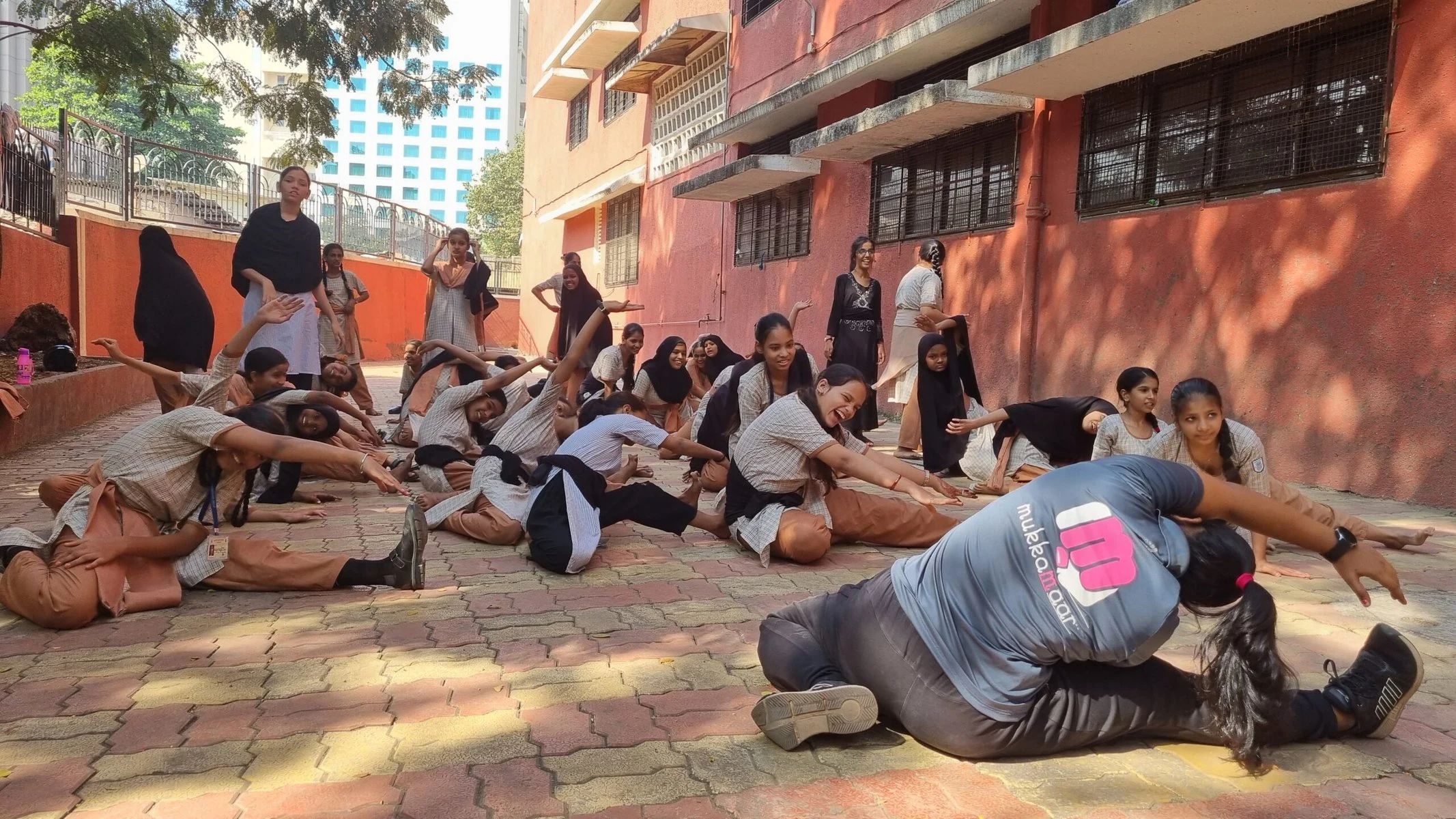 MukkaMaar partners with 56 government schools in Mumbai. Courtesy of MukkaMaar
MukkaMaar partners with 56 government schools in Mumbai. Courtesy of MukkaMaar
Contrast this with what MukkaMaar’s founder Ishita Sharma remembers from a casual conversation with a group of middle-school girls a few years ago. When asked what they would do if someone attacked them on the streets, they unanimously responded: Shout bachao bachao! (help).
“They didn’t even think about it,” Sharma says. “It was a natural response to expect someone else to come and save them, because that is what they have been taught, what they have seen in movies.”
It was with the basic aim to shift this control from the outsider to the individual that Sharma started MukkaMaar — roughly translating to “throw a punch” — as an empowerment program for adolescent girls. “Women need to take responsibility for their own safety and not succumb to the ‘What will the poor woman do?’ narrative,” she explains.
Courtesy of MukkaMaar
At MukkaMaar’s free workshops, girls learn martial arts and build confidence. They also learn about communication and consent.
Sharma began in 2016 with four girls on a public beach and the conviction that teaching self-defense was the way to empower them. Over seven years and 3,000 girls later, she has learned that along with martial arts, there is also a need for a change in fundamental beliefs and attitudes. She shares examples of how these girls are schooled to be “good daughters” who grow up to be “good wives” (for instance, to blindly marry the man chosen by their parents, as opposed to committing to a “love marriage”). She explains that there is a need to teach them to question and debate at home, negotiate for their rights, develop and assert their own personalities, and so on.
MukkaMaar now partners with 56 government schools in Mumbai, where martial arts teachers are trained to listen to and counsel the girls, who open up with their own stories. These trainers are young men and women in their late teens and 20s, who usually work in teams of two. At 19, national level boxing champion Aradhana Gaund is not much older than the girls she trains. “They treat me like their friend, and I laugh and cry with them,” she says.
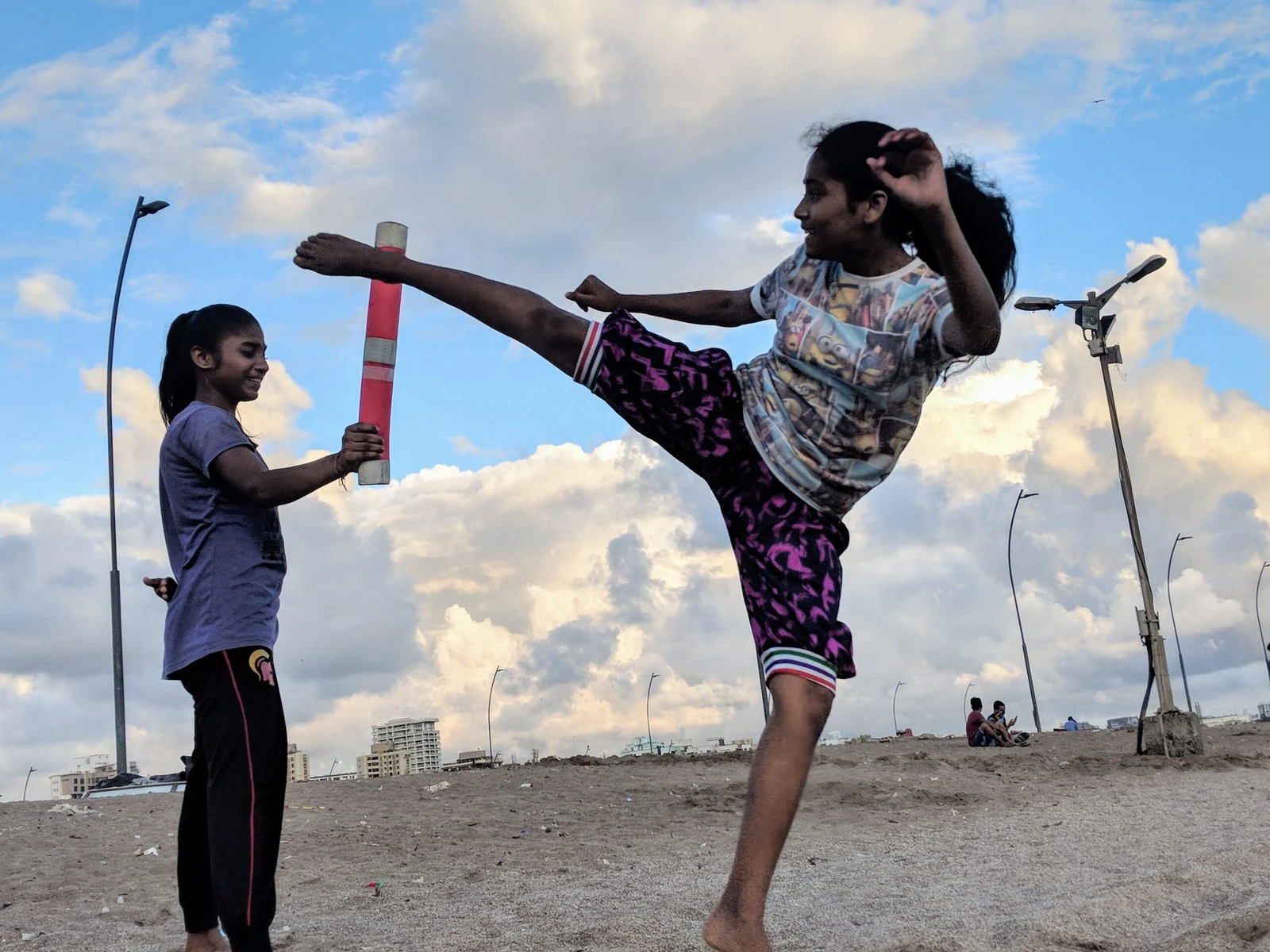 In the workshops, girls learn that violence is not a knee-jerk response, but a last resort. Courtesy of MukkaMaar
In the workshops, girls learn that violence is not a knee-jerk response, but a last resort. Courtesy of MukkaMaar
Elsa Marie D’Silva, founder of Red Dot Foundation, a nonprofit working to create safe spaces for women, says it can be intimidating for young women to stand up against harassment, and so “it is important to show them how they can speak out together, along with their friends or as a group, to call out bullies.” Indeed, this is one of the things that gives Gaund the most satisfaction: seeing how these classes have taught the girls to band together and support one another.
According to the Global Gender Gap Report 2023, India ranks a dismal 127 out of 146 countries, based on indices such as access to education, economic opportunities and health. What is even more concerning is the unceasing, systemic violence against women that takes several forms including intimate partner violence, rape and assault, dowry deaths, acid attacks and everyday street harassment.
Crushed by negative news?
Sign up for the Reasons to be Cheerful newsletter.
[contact-form-7]
Women are told from childhood to keep their heads down and take these things in stride, that to react would be futile and even dangerous. They internalize this to such an extent that they suffer harassment silently, which in turn encourages their abusers to carry on with impudence. This is where MukkaMaar has been making a small but significant difference.
Iqra, 13, says, “Earlier, I used to move away quietly when a man touched or groped me in the [public] bus. But now, I just make my voice loud and strong like I have been taught, and tell them to stop it.” At this, her friend Fatima chimes in, “Now we feel like we can also walk and talk like the boys.”
Courtesy of MukkaMaar
Ishita Sharma started MukkaMaar with the goal of changing girls’ “natural response to expect someone else to come and save them” — and showing them that they can be the ones in control.
But they have both also been taught that violence is not a knee-jerk response, but a last resort. “If we fight, we will also get hurt, but we can speak up,” Iqra declares with the wisdom of one far older.
And speak up they do, at every chance. “At my cousin’s wedding, a boy I don’t know started teasing me,” Fatima recalls. “When I shouted at him, his mother intervened and scolded him. Earlier I used to feel nervous in such situations, I used to think, ‘I am a small girl, what can I do?’”
As Sharma describes it, “We are not telling them that violence is the answer, but that violence should not be tolerated.”
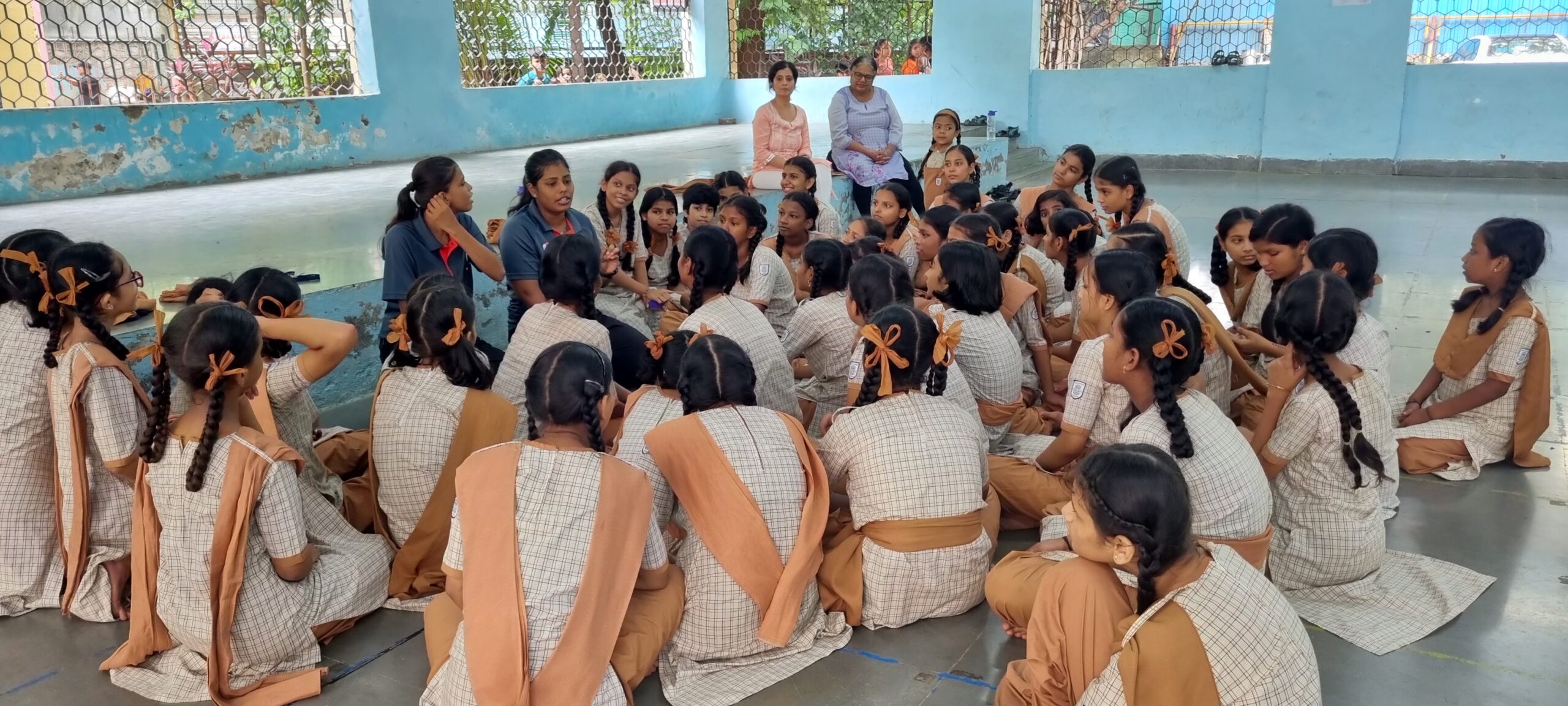 “We train them to vocalize their feelings, to open up their shoulders and lift up their chins,” explains one of MukkaMaar’s trainers. Courtesy of MukkaMaar
“We train them to vocalize their feelings, to open up their shoulders and lift up their chins,” explains one of MukkaMaar’s trainers. Courtesy of MukkaMaar
The MukkaMaar website states, “It is necessary to recognize that violence includes microaggressions, discrimination, threats, and loss of opportunity as much as assault.” The training, therefore, does not just cover self-defense but also building physical fitness and emotional strength, as well as boosting (and often instilling) self-confidence.
Senior training fellow, Bhishma Mallah, 26, who has been with MukkaMaar for over four years, says that the girls begin with so many barriers, like shame and fear, that even to get them to exercise in front of others or to express themselves verbally is a challenge. “We train them to vocalize their feelings, to open up their shoulders and lift up their chins. We have to tell them repeatedly to forget about adjusting their dupatta [traditional scarf used to cover head or shoulders] and focus on the activity.”
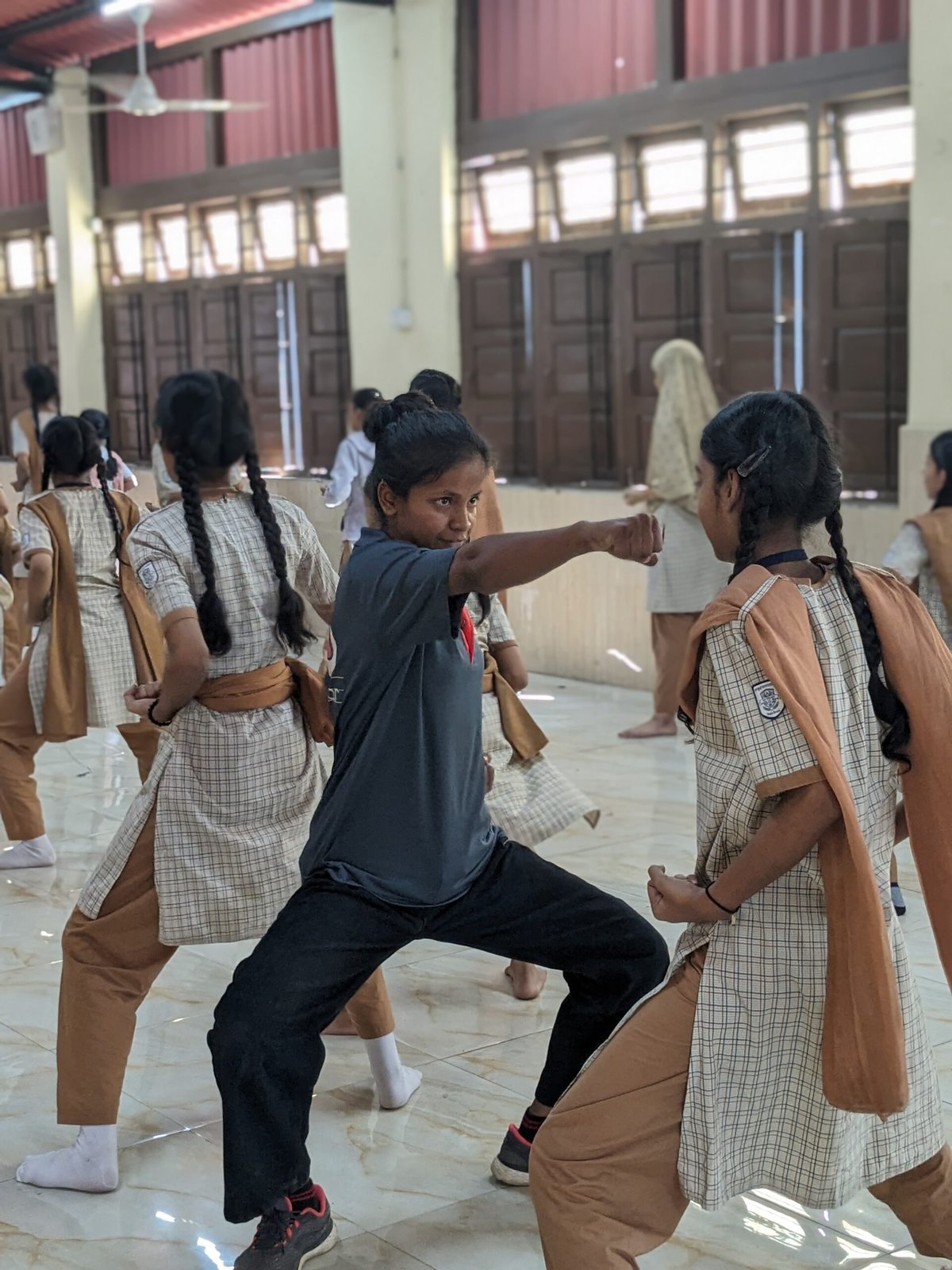 Even during workshops, the girls ask for permission before making physical contact. Courtesy of MukkaMaar
Even during workshops, the girls ask for permission before making physical contact. Courtesy of MukkaMaar
One of the many ways in which the trainers chip away at the diffidence of these young girls is by making them chant “I am important” even as they practice their moves. Or asking them to imagine how a dog growls, and to channel that aggression in their kicks and punches.
Each hour-long session includes 20 minutes of conversations and counseling, with the remaining time devoted to physical training. “We teach them about concepts like boundaries, consent and safe touch. Even during lessons, they have to take permission from their partner before any physical contact,” explains Mallah.
Sharma admits it took her a couple of years to realize that for a girl to build agency, there is a lot of familial and social conditioning that needs to be undone. “There is no point in teaching them martial arts alone, with its focus on discipline and technique — because unless we teach them critical thinking, it is all pointless, and forgotten the minute they step out of the classroom,” says Sharma.
Red Dot Foundation founder D’Silva adds a word of caution: “It’s not enough to just empower the girls to speak up, it is also the responsibility of adults to listen to them when they do. If their parents or teachers don’t take them seriously, then the child will quickly learn not to tell anyone — because there is the added fear of having their personal freedom curtailed under the guise of protecting them or saving the family honor.”
A change in the larger ecosystem may take a long time, but it is clear that something is shifting within these girls. While one cohort confronted a cop making a video call in front of them and challenged him to prove he was not taking their photos without permission, another group of girls gathered the courage to file a police complaint against their physical education teacher who had been harassing them. For others, it has meant something as seemingly trivial as talking back to their fathers and challenging gendered rules and restrictions.
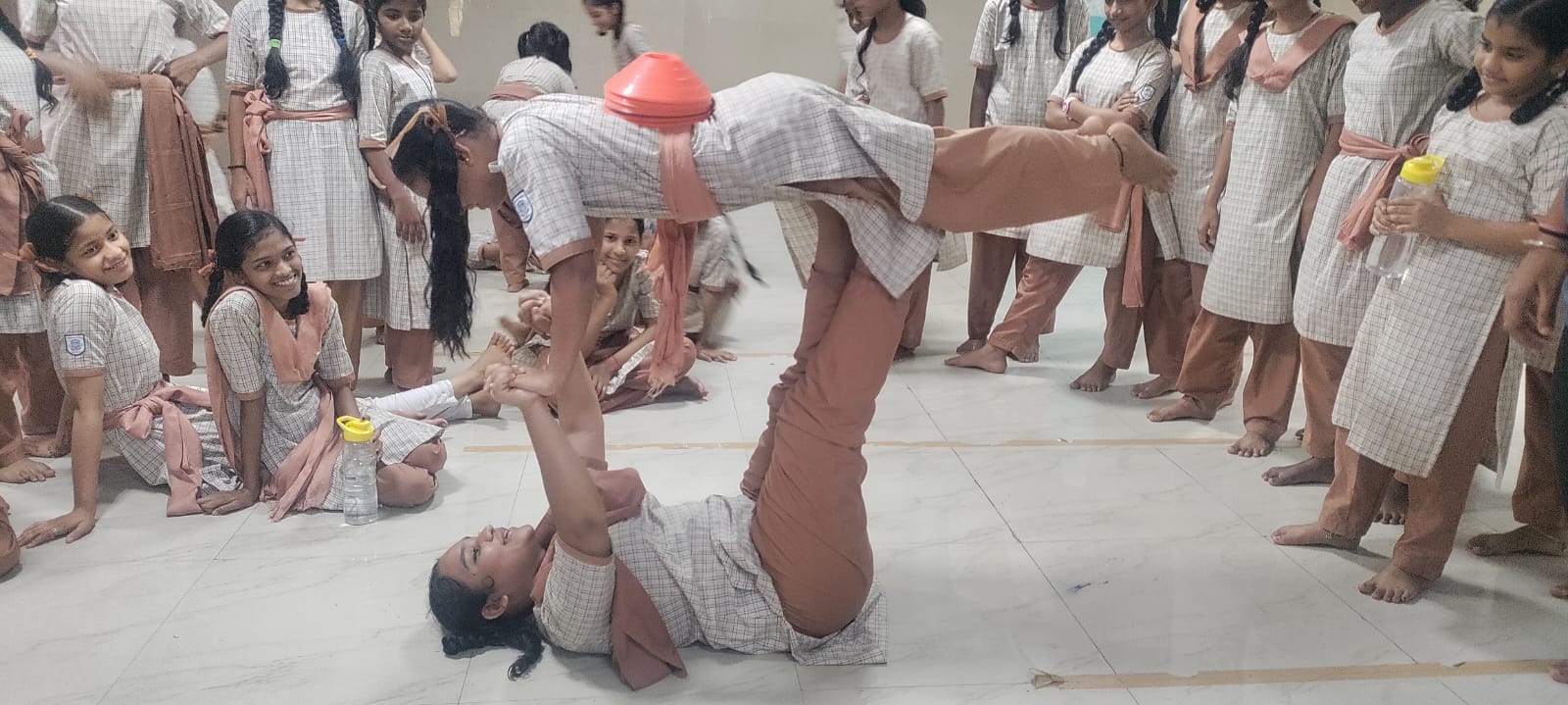 “I have learned to be strong and to face people with confidence,” one MukkaMaar student says, “whether it is my parents at home or strangers outside.” Courtesy of MukkaMaar
“I have learned to be strong and to face people with confidence,” one MukkaMaar student says, “whether it is my parents at home or strangers outside.” Courtesy of MukkaMaar
These may seem like small incidents, but for these young girls in Mumbai, the freedom to think independently and challenge those around them has been life-changing.
In the short run, Sharma says MukkaMaar wants to focus on fewer places and create retention, rather than spread the program thin all over the city. The future is digital for MukkaMaar alumni, with a chatbot that helps the girls have a two-way conversation about self-defense techniques, physical fitness, understanding of different types of gender violence and soft skills like communication and negotiation. This keeps them connected to the program, and to everything they learned in it, even after they leave.
The post How Teen Girls in Mumbai Are Learning to Stand Tall appeared first on Reasons to be Cheerful.
Students occupy Bristol uni building in protest at ‘profits from genocide’
Students demand divestment and an end to academic ties
Bristol University students have taken control of one of the university’s Wills Memorial Building in a protest to demand an end to its ‘complicity with arms companies’ and to call for a series of actions on its part to ‘support Palestine and Palestinians’:
The demanded actions include:
- an end to cooperation with weapons manufacturers
- protection for Palestinian students and special consideration for those taking exams who have been affected by Israel’s slaughter in Gaza
- protection for anti-Zionist beliefs among staff and students – an issue on which Bristol university has a shameful record and has been the scene of intense pressure campaigns by pro-Israel groups claiming that anti-Zionism, opposition to the settler-colonial state that has displaced Palestinians and treats them as inferior
- recognition of the existence of Palestine – an existence denied by hardcore supporters of Israel
- scholarships for Palestinian refugees
Israel has killed over forty thousand Palestinian civilians, more than two thirds of them women and children, and injured twice as many, in its genocidal assault on Gaza and has ignored orders from the International Court of Justice to cease its slaughter and allow food, fuel and medicines into Gaza immediately. Gaza is now in famine, with experts predicting that more will die in the coming months from hunger and disease than from Israel’s bombs, missiles and bullets, with children again worst affected.

Palestinian flags can be seen through the Wills building’s doors. The figures in the second image have been blurred to protect identities.
The group is also demanding an end to the use of a ‘check-in’ system that tracks the location of students.
Wednesday’s action is not the first by Bristol students demanding justice for Palestinians and an end to discrimination against them and their supporters. Four months ago, students protested in the university’s ‘profits from genocide’:

And earlier this month, a group occupied Bristol University’s Victoria Rooms in a pro-Gaza protest.
The British government has mounted a pressure campaign against universities, threatening to defund them if they allow ‘extremism’ or ‘antisemitism’ in the form of pro-Palestinian speech and activism. Shamefully, a number of universities have capitulated to pressure from the UK state and from pro-Israel groups claiming that speech against Israel’s crimes and occupation of Palestinian land infringe on their rights and constitutes ‘hate’ toward Jews, even though many UK Jews oppose Israel’s actions and oppression of Palestinians.
Last month, former Bristol professor David Miller won a landmark employment tribunal case against the university, which had sacked him after pressure from pro-Israel groups, despite lawyers it appointed to run two investigations finding that he had said nothing antisemitic. The win set a precedent that anti-Zionist political beliefs are a protected characteristic under equalities law and cannot be used as grounds for dismissal. Skwawkbox understands that Prof Miller is not involved in the students’ protest.
Solidarity with students in Bristol and elsewhere who are demanding an end to complicity in war crimes.
SKWAWKBOX needs your help. The site is provided free of charge but depends on the support of its readers to be viable. If you’d like to help it keep revealing the news as it is and not what the Establishment wants you to hear – and can afford to without hardship – please click here to arrange a one-off or modest monthly donation via PayPal or here to set up a monthly donation via GoCardless (SKWAWKBOX will contact you to confirm the GoCardless amount). Thanks for your solidarity so SKWAWKBOX can keep doing its job.
If you wish to republish this post for non-commercial use, you are welcome to do so – see here for more.
Universities make astounding discovery: AUKUS lacks a social licence!
A not-so-happy anniversary: Usually, a first anniversary is an occasion for all-round rejoicing and back-slapping. So, it was to be expected that there’d be universal self-congratulation on the first anniversary of Anthony Albanese’s, Rishi Sunak’s and Joe Biden’s announcement on 13 March 2023 that Australia would purchase nuclear-powered attack-class submarines from the US as part Continue reading »
A university career is no longer the best way to channel a fine mind
A friend of mine resigned from her university job in February 2024 just weeks before term started. She couldn’t face another year. She was old enough to retire but I had thought she might have a couple more years of teaching in her. The bureaucracy, the rules, lowering standards were too much. Another friend, an Continue reading »
Fully funding public schools is critical for the government’s education agenda
The recent announcement by the Federal Minister for Education, Jason Clare, that the government wants to raise the percentage of young people achieving a tertiary education to 80% points to the huge stakes at issue in the current negotiations between the Federal and state governments on the next school funding agreements. To have any chance Continue reading »
Australia’s school system: OOPs!
“The quasi market-based nature of the Australian education system entrenches disadvantage.” The degree of socio-educational stratification among schools makes Australia an anomaly among comparable democracies. Inequity is at a level where an archaeologist delving in to the system might label it as Out-of-Place stuff! Soon after coming to office, the Albanese Government recognised the need Continue reading »
The future of Australia’s overseas student program
At over 40 percent of net migration, Australia’s overseas student program was growing unsustainably before the pandemic. The border closures hid many of the problems and led the Coalition Government to make policy changes that made the situation much worse when borders re-opened (unrestricted work rights, fee-free visa applications, covid visa). The Albanese Government significantly Continue reading »
Indifference killing democracy in Indonesia
A reason for Indonesians overwhelmingly supporting cashiered general Prabowo Subianto and a likely military dictatorship is because the electorate rarely reads; voters haven’t been taught to think critically so know little of their new president’s past. In 1998, Prabowo was stripped of his rank and discharged from the Army for disobeying orders. His squad arrested Continue reading »
‘Wraparound Support’ Meets Black and Hispanic Girls’ Overlooked Mental Health Needs
This story was produced by The Hechinger Report, a nonprofit, nonpartisan news outlet focused on education.
On a sunny but brisk November afternoon inside Robert Abbott Middle School, six eighth-grade girls quickly filed into a small but colorful classroom and seated themselves in a circle.
Yuli Paez-Naranjo, a Working on Womanhood counselor, sported a purple WOW T-shirt as she led the group in a discussion about how values can inform decisions.
“Do you ever feel like two little angels are sitting on each of your shoulders, one whispering good things to you, the other whispering bad things?” Paez-Naranjo asked the girls. The students nodded and giggled.
At the 50-minute WOW circle, girls have a chance to set aside the pressures of the school day, laugh with and listen to one another, and work through personal problems. The weekly meeting is the centerpiece of individual and group therapy that WOW offers throughout the school year to Black and Hispanic girls, and to students of all races who identify as female or nonbinary, in grades six to 12.
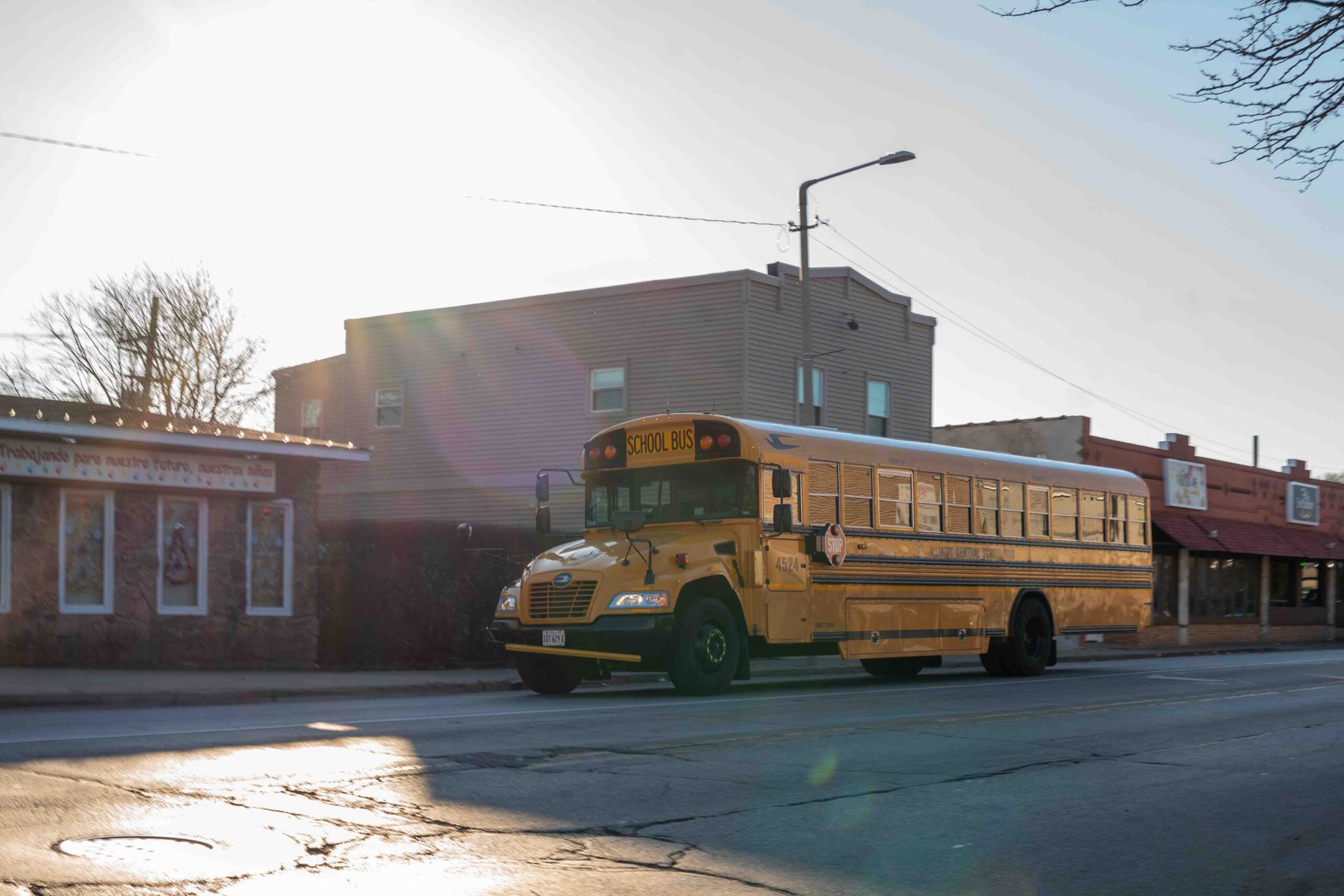 The Working on Womanhood program operates in Waukegan, Illinois, and several other school districts around the country. Credit: Camilla Forte / The Hechinger Report
The Working on Womanhood program operates in Waukegan, Illinois, and several other school districts around the country. Credit: Camilla Forte / The Hechinger Report
Created in 2011 by Black and Hispanic social workers at the nonprofit organization Youth Guidance, WOW’s goal is to build a healthy sense of self-awareness, confidence and resilience in a population that is often underserved by mental health programs.
Youth Guidance offers WOW to about 350 students in Waukegan Community Unit School District 60, which serves an industrial town of about 88,000 located about 30 miles north of Chicago. Just over 93 percent of the district’s 13,600 students are Black or Hispanic, and about 67 percent come from families classified as low income.
The program also serves students in Chicago, Boston, Kansas City and Dallas. WOW counselors work with school-based behavioral health teams, administrators and teachers to identify students with high stress levels who might benefit from the program.
Recent research shows that WOW works: At a time when teen girls’ mental health is in crisis, a 2023 University of Chicago Education Lab randomized control trial found that WOW reduced PTSD symptoms among Chicago Public Schools participants by 22 percent and decreased their anxiety and depression.
Multiple hurdles, including funding, counselor burnout and distrust of mental health programs stand in the way of getting WOW to more students. But one way the program overcomes impediments is by bringing the program to the place students spend most of their time — school.
 Yuli Paez-Naranjo, the Working on Womanhood counselor based at Robert Abbott Middle School in Waukegan, Illinois, said she’s seen a decrease in anger and fights among the girls participating in the mental health support program. Credit: Camilla Forte / The Hechinger Report
Yuli Paez-Naranjo, the Working on Womanhood counselor based at Robert Abbott Middle School in Waukegan, Illinois, said she’s seen a decrease in anger and fights among the girls participating in the mental health support program. Credit: Camilla Forte / The Hechinger Report
Paez-Naranjo, who is so well-liked among Abbott students that even kids who aren’t in the program seek her out, posed a question to the group.
“Let’s talk about positive and negative consequences of certain decisions. How about fighting?” she asked.
“The only positive outcome is you may find out how strong you are,” said Deanna Palacio, one of the girls.
“Why fight when you can talk it out?” asked another student, Ka’Neya Lehn.
“Right? What’s the point?” said a third girl, Ana Ortiz.
Crushed by negative news?
Sign up for the Reasons to be Cheerful newsletter.
[contact-form-7]
Nacole Milbrook, Youth Guidance chief program officer, said WOW was developed to address often overlooked needs among Hispanic and Black girls. “Girls have been left out [of mental health support initiatives], mainly because they are not making trouble,” she said.
A baseline study of over 2,000 girls in Chicago’s public schools, conducted by the University of Chicago Education Lab team, found “staggeringly high” rates of trauma exposure: Nearly one third of the participating young women had witnessed someone being violently assaulted or killed, and almost half lost someone close to them through violent or sudden death. Some 38 percent of girls in this group showed signs of PTSD, double the rate of service members returning from Iraq and Afghanistan.
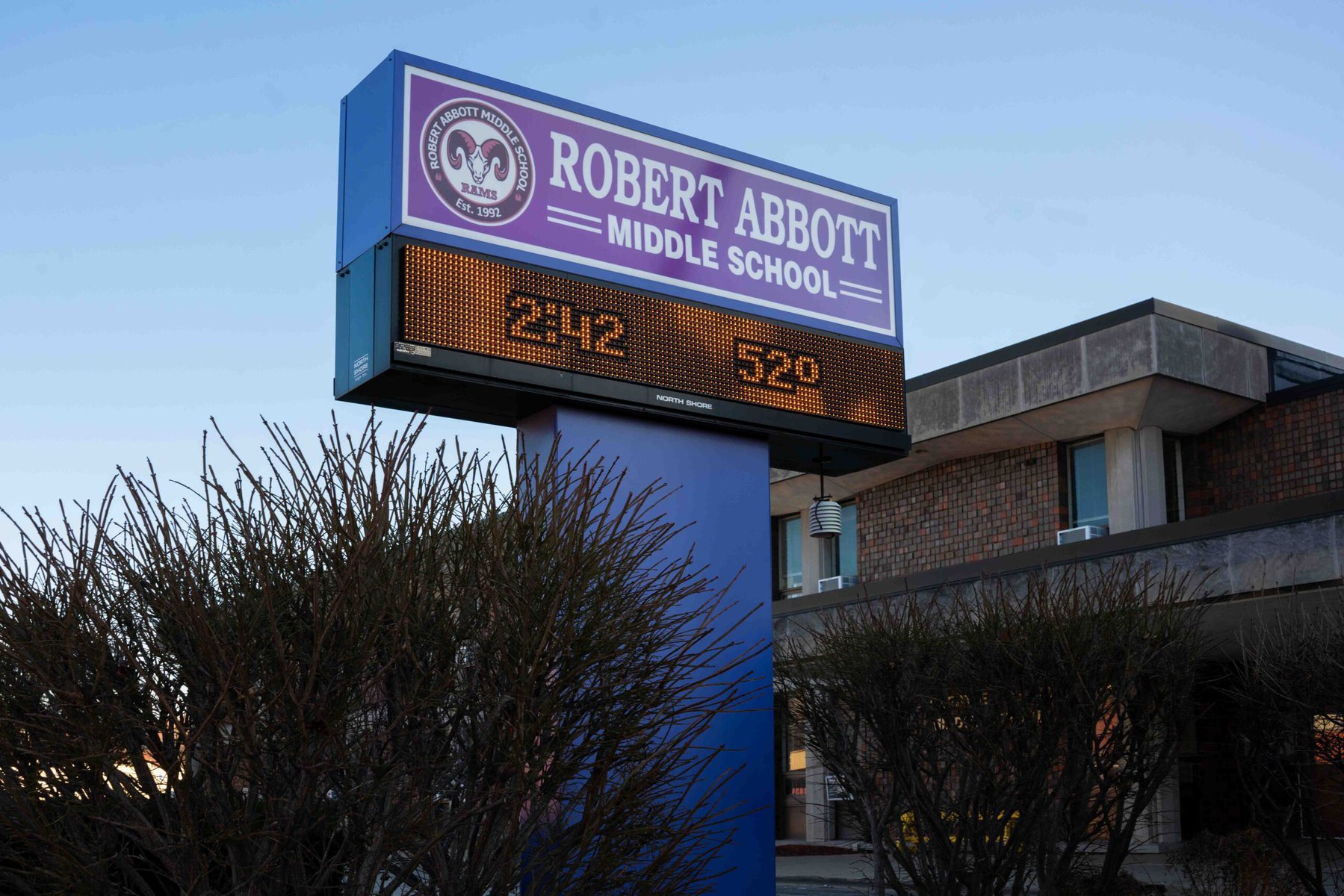 Once a week, girls at Robert Abbott Middle School and other schools in the Waukegan, Illinois, area meet with their peers and a counselor to work through personal problems. Credit: Camilla Forte / The Hechinger Report
Once a week, girls at Robert Abbott Middle School and other schools in the Waukegan, Illinois, area meet with their peers and a counselor to work through personal problems. Credit: Camilla Forte / The Hechinger Report
Paez-Naranjo and fellow WOW counselor Te’Ericka Kimbrough, who works at Waukegan Alternative/Optional Educational Center, have supported students who have suffered sexual assault. Some participants in their circles are teen parents. Others are trying to resist negative peer pressure. Still others are in families that are struggling financially.
Compared to other students, Black and Hispanic students have a harder time getting mental health support in school. In-school mental health support targeted to girls, especially evidence-based, sustained programs like WOW, is scarce or nonexistent in many public schools.
Even scarcer is mental health support from providers who can give culturally responsive care. Only five percent of US mental health providers are Hispanic. Just 4 percent are Black.
 Ana Ortiz, an eighth grader at Robert Abbott Middle School, said the Working on Womanhood program “helps me understand better about myself.” Credit: Camilla Forte / The Hechinger Report
Ana Ortiz, an eighth grader at Robert Abbott Middle School, said the Working on Womanhood program “helps me understand better about myself.” Credit: Camilla Forte / The Hechinger Report
Sally Nuamah, associate professor of urban politics in human development and social policy at Northwestern University, said the tendency of adults to view Black youth as more adult-like than their white peers can shroud the mental health needs of Black children. In addition, the girls’ own positive behavior can mask their needs: In a study of the WOW program, participants were found to have strong school attendance and at least a B average, even as more than a third showed signs of post-traumatic stress disorder.
“They are perceived as resilient and possessing grit,” Nuamah said. “This obscures the real mental health needs of students of color and perpetuates institutionally racist policies because these students are not perceived as needing the same resources.”
Serving students where they are physically present nearly 200 days per year is one way to fill the too-often unmet need for support, Nuamah said.
“WOW is the only [school-based] organization that does what it does to the extent that it does,” she said. “Most [mental health] services are offered out of school.”
Laurel Crown, Youth Guidance senior research and evaluation manager, said the nonprofit is working to figure out just what parts of the program work best. End-of-school-year participant surveys, which use measures similar to those used in the Education Lab study, suggest that the relationships developed between WOW counselors and participants are a key reason the program is effective.
“Our theory of change is that WOW works because … [students] are attending this incredibly powerful support group every week and this support person is there every day in the school for them,” Crown said.
WOW counselors are “systemically engaged” in the schools where they are based, said Fabiola Rosiles-Duran, WOW program supervisor for Waukegan. They stay informed about whole-school dynamics by being part of behavioral health team and all-staff meetings.
Counselors Kimbrough and Paez-Naranjo added that daily access to teachers and staff provides wraparound support for their students. The counselors’ presence also helps them respond to acute situations immediately and follow up on student progress each school day.
“If I need extra support with a student, I can lean on the school behavioral health team,” Kimbrough said. She added that if she has a student in crisis, being able to see that student
regularly helps her know if their interventions are working.
 Deanna Palacio, an eighth grader at Robert Abbott Middle School in Waukegan, Illinois, said she feels “heard and understood” by her peers and counselor in the Working on Womanhood program. Credit: Camilla Forte / The Hechinger Report
Deanna Palacio, an eighth grader at Robert Abbott Middle School in Waukegan, Illinois, said she feels “heard and understood” by her peers and counselor in the Working on Womanhood program. Credit: Camilla Forte / The Hechinger Report
Providing intensive support to students every school day can be emotionally taxing for WOW counselors. Youth Guidance provides group training and individual support to help counselors maintain their own emotional health.
During their first year on the job, counselors participate in three hours of curriculum training each month plus three days of refresher courses. Many training activities mirror those the counselors will later use with their students.
WOW leaders also check in every weekday to offer support to the counselors. Those new to WOW also attend a two-day, three-night retreat that “helps counselors and staff figure out what’s happening within ourselves,” said Ngozi Harris, Youth Guidance director of program and staff development, “so we have the fuel to do this work.”
One study found that the multiple layers of support WOW offers students and staff, at a cost of about $2,300 per participant, are cost-effective. Still, that can amount to a significant portion of a district’s or school’s annual budget.
But Jason Nault, Waukegan CUSD 60’s associate superintendent of equity, innovation and accountability, said WOW is well worth the cost. Earlier this year, the district’s Board of Education approved a two-year extension of its contract with WOW and its counterpart for male students, Becoming a Man, at a cost of $4.2 million.
Nault said data Youth Guidance collects at the end of each school year shows WOW students are less depressed and anxious, more self-confident and have less post-traumatic stress.
Yet multiple implementation challenges exist for WOW and other school-based student support programs. One is that the work of counselors is isolating and can lead to psychological burnout, said Inger Burnett-Zeigler, associate professor of psychology at Northwestern’s Feinberg School of Medicine.
“There is significant and chronic and traumatic stress the WOW counselors experience,” she said. Burnett-Zeigler is working with WOW to develop and test an evidence-based mindfulness intervention to support counselors.
“Counselor well-being is important in and of itself,” said Burnett-Zeigler. It also can support youth outcomes, she said.
 By being embedded in the schools such as Robert Abbott Middle School in Waukegan, Illinois, Working on Womanhood counselors say they can build deeper bonds with the students in their mental health support program. Credit: Camilla Forte / The Hechinger Report
By being embedded in the schools such as Robert Abbott Middle School in Waukegan, Illinois, Working on Womanhood counselors say they can build deeper bonds with the students in their mental health support program. Credit: Camilla Forte / The Hechinger Report
Another barrier experienced by programs like WOW is that, according to research, Hispanic and Black families are more reluctant to seek out mental health support and treatment than other ethnic and racial groups. The WOW program works to build trust not only with the students, but
with their parents and family members.
“Families of color have a tendency to not name mental health issues as mental health issues,” said Milbrook, the chief program officer for the organization that oversees WOW. “Seeking treatment still has a stigma, even for children.”
Milbrook said the school-based setting is key for destigmatizing both mental health conditions and treatment.
“Being in school and participating in the groups with other students, understanding that you’re not the only person dealing with these same problems, and talking about them in ways that don’t feel like their idea of traditional therapy” all help, she said.
Also essential, Milbrook added, is fostering a sense of belonging. “We give the participants WOW T-shirts, and now they can walk around the school identifying as Working on Womanhood girls,” she said. “All of a sudden, nobody is ashamed to be in this group.”
Deanna, the Abbott eighth grader, added that the sense of belonging WOW fosters has helped her feel less lonely.
“You feel heard and understood here,” she said.
Although the school setting presents advantages for WOW, it can also involve implementation challenges. Youth Guidance’s Harris said that both WOW staff and school staff want positive outcomes for WOW students, but WOW’s healing-centered approach might conflict with a school’s discipline policy. So, school staff might initially be wary of program staff and counselors.
Schools also sometimes underestimate the expertise of the counselors, and sometimes even ask them to take on tasks like cafeteria monitoring that are not their responsibility.
“It takes a year of building relationships, really being intentional about how to collaborate with the school,” said Harris. “Until that trust is built, you are an outsider.”
Paying for the program is another challenge. Although Waukegan CUSD 60 covers all program costs, most districts do not. Youth Guidance relies primarily on philanthropic support to pay for its programs.
Youth Guidance is less likely to tap into public funding sources like Medicaid because the public assistance program’s cumbersome processes can lead to higher program costs and even threaten the trust WOW builds with students and their families.


Become a sustaining member today!
Join the Reasons to be Cheerful community by supporting our nonprofit publication and giving what you can.
For example, WOW counselors often make numerous phone calls to parents, or visit them at home. It’s time well spent, Milbrook said, but it’s not financially productive. Counselors can only bill their time to Medicaid after a parent signs a consent form.
Despite some of these implementation challenges, WOW leaders and counselors consider the Waukegan WOW program a success.
“As a whole [group], I’ve seen a decrease in anger and fights,” said Paez-Naranjo, the Abbott Middle WOW counselor.
The lessons on mindfulness during WOW Circles at Abbott Middle School have helped Ana Ortiz build confidence in her emerging identity as a young woman. She, like her other classmates in the program, returned for a second year after starting WOW as seventh graders.
“Before I came here, I was not finding myself at all,” Ana said. “I wanted to know, how is it, being a woman? I wanted to know what other girls’ opinions and perspectives were.”
Paez-Naranjo said she has seen Ana’s growth since last school year.
“Ana has stepped out of her comfort zone a lot more. She feels more confident to share intimate details about her life and is willing to support anyone in need,” said Paez-Naranjo.
“And she is so much more smiley,” Paez-Naranjo added. “You can see her smile from a mile away.”
Later, on her way out of the Wednesday Abbott WOW circle, Ana turned back to offer a final take on how WOW has helped her.
“It makes me feel free in here,” she said, flashing one of those smiles. “I understand better about myself.”
The post ‘Wraparound Support’ Meets Black and Hispanic Girls’ Overlooked Mental Health Needs appeared first on Reasons to be Cheerful.






